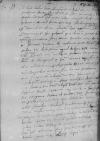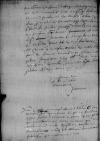Cum his diebus huc adveniens forte incidissem in latorem praesentium itineri istuc ad vos se iam parantem volui praestantiam Tuam ... superinscribed⌈... illegible⌈...... illegible⌉... superinscribed⌉ adventus saltem mei (cum aliud non haberem) certiorem facere, qui itaque nudiusquartus quam has ad te darem Laredo (Laretum), town and harbor in northern Spain, Cantabria, 150 km W of Bilbao⌊LaretumLaredo (Laretum), town and harbor in northern Spain, Cantabria, 150 km W of Bilbao⌋ huc applicui incolumis superinscribed⌈incolumisincolumis superinscribed⌉. Ubi quatriremem seu gale written over i⌈iee written over i⌉onem, qua dominus probably Louis of Flanders Lord of Praet (a Prato, de Prato, Lodewijk van Praet, Pratensis, Ludovicus a Flandria, Louis de Flandres Seigneur de Praet, Cat(h)o) (*1488 – †1555), diplomat and politician in the service of the Habsburgs, friend and patron of many scholars and writers, admirer of Erasmus of Rotterdam; 1515-1522 High-Bailiff of the city of Ghent, 1523-1549 - of Bruges, 1517 member of the Privy Council of Charles V, 1522-1525 resident ambassador in England, 1525 ambassador at the court of the regent of France, Louise of Savoy, 1530 Chamberlain to the Emperor, 1536 member of the Council of State (as a close adviser to Regent Mary of Hungary); 1540 head of the Finance Council; 1544 Governor of Holland, Zeeland and Utrecht (CE, vol. 2, p. 41-42; DE VOCHT 1961, p. 38-39; DBE, vol. 20, p. 174-176)⌊a Pratoprobably Louis of Flanders Lord of Praet (a Prato, de Prato, Lodewijk van Praet, Pratensis, Ludovicus a Flandria, Louis de Flandres Seigneur de Praet, Cat(h)o) (*1488 – †1555), diplomat and politician in the service of the Habsburgs, friend and patron of many scholars and writers, admirer of Erasmus of Rotterdam; 1515-1522 High-Bailiff of the city of Ghent, 1523-1549 - of Bruges, 1517 member of the Privy Council of Charles V, 1522-1525 resident ambassador in England, 1525 ambassador at the court of the regent of France, Louise of Savoy, 1530 Chamberlain to the Emperor, 1536 member of the Council of State (as a close adviser to Regent Mary of Hungary); 1540 head of the Finance Council; 1544 Governor of Holland, Zeeland and Utrecht (CE, vol. 2, p. 41-42; DE VOCHT 1961, p. 38-39; DBE, vol. 20, p. 174-176)⌋ semel ipsiusque comitiva iam tertio reiecta fuit, et cum eo amicos veteres et optimos, quos omnes iam pridem uti discesserant apud The Belgians ⌊BelgasThe Belgians ⌋ esse ratus sum, inveni superinscribed⌈inveniinveni superinscribed⌉, quorum dominus probably Melchior Colditz (Melchior a Germania) (†after 1535), diplomat in the service of Christian II of Oldenburg, in 1523 joined the King in his exile and participated in the education of the royal children; 1529 diplomat in the service of the Oldenburgs, in 1523 joined Christian II in his exile and participated in the education of the royal children, councillor and principal secretary to Duke Hans (son of King Christian II of Oldenburg), 1532 Chancellor of Count Christopher von Oldenburg, 1534, 1535 his envoy to Germany and to the Habsburg Netherlands to establish relations between the Count and the court of the Regent of the Habsburg Netherlands, envoy of the King Christian II to Germany, England, the Habsburg Netherlands and Spain, in 1536 ambassador at the court of Queen Mary of Hungary (BENNINGHOVEN, 102, 4)⌊Melchiorprobably Melchior Colditz (Melchior a Germania) (†after 1535), diplomat in the service of Christian II of Oldenburg, in 1523 joined the King in his exile and participated in the education of the royal children; 1529 diplomat in the service of the Oldenburgs, in 1523 joined Christian II in his exile and participated in the education of the royal children, councillor and principal secretary to Duke Hans (son of King Christian II of Oldenburg), 1532 Chancellor of Count Christopher von Oldenburg, 1534, 1535 his envoy to Germany and to the Habsburg Netherlands to establish relations between the Count and the court of the Regent of the Habsburg Netherlands, envoy of the King Christian II to Germany, England, the Habsburg Netherlands and Spain, in 1536 ambassador at the court of Queen Mary of Hungary (BENNINGHOVEN, 102, 4)⌋(?) primas tenet, tum dominum de Longeuall(?) a John Zápolya (János Szapolyai) (*1487 – †1540), 1526-1540 King of Hungary; son of István Szapolyai and Jadwiga of Cieszyn in 1540 married Isabella, dauther of of King Sigismund Jagiellon of Poland. He fought against Ferdinand of Habsburg for the right to the title of King of Hungary⌊serenissimo Boemiae regeJohn Zápolya (János Szapolyai) (*1487 – †1540), 1526-1540 King of Hungary; son of István Szapolyai and Jadwiga of Cieszyn in 1540 married Isabella, dauther of of King Sigismund Jagiellon of Poland. He fought against Ferdinand of Habsburg for the right to the title of King of Hungary⌋ domino nostro olim ad Charles V of Habsburg (*1500 – †1558), ruler of the Burgundian territories (1506-1555), King of Spain as Charles I (1516-1556), King of Naples and Sicily, King of the Romans (1519-1530), Holy Roman Emperor of the German Nation (elected 1519, crowned 1530, abdicated 1556); son of Philip I the Handsome and Joanna the Mad of Castile⌊caesaremCharles V of Habsburg (*1500 – †1558), ruler of the Burgundian territories (1506-1555), King of Spain as Charles I (1516-1556), King of Naples and Sicily, King of the Romans (1519-1530), Holy Roman Emperor of the German Nation (elected 1519, crowned 1530, abdicated 1556); son of Philip I the Handsome and Joanna the Mad of Castile⌋ per dispositos equos missum written over s⌈smm written over s⌉ nonullosque alios aulicos, qui ut me conspexere tam inopinatum adventum non minus admirati quam laetati sunt, fassusque est probably Melchior Colditz (Melchior a Germania) (†after 1535), diplomat in the service of Christian II of Oldenburg, in 1523 joined the King in his exile and participated in the education of the royal children; 1529 diplomat in the service of the Oldenburgs, in 1523 joined Christian II in his exile and participated in the education of the royal children, councillor and principal secretary to Duke Hans (son of King Christian II of Oldenburg), 1532 Chancellor of Count Christopher von Oldenburg, 1534, 1535 his envoy to Germany and to the Habsburg Netherlands to establish relations between the Count and the court of the Regent of the Habsburg Netherlands, envoy of the King Christian II to Germany, England, the Habsburg Netherlands and Spain, in 1536 ambassador at the court of Queen Mary of Hungary (BENNINGHOVEN, 102, 4)⌊dominus Melchiorprobably Melchior Colditz (Melchior a Germania) (†after 1535), diplomat in the service of Christian II of Oldenburg, in 1523 joined the King in his exile and participated in the education of the royal children; 1529 diplomat in the service of the Oldenburgs, in 1523 joined Christian II in his exile and participated in the education of the royal children, councillor and principal secretary to Duke Hans (son of King Christian II of Oldenburg), 1532 Chancellor of Count Christopher von Oldenburg, 1534, 1535 his envoy to Germany and to the Habsburg Netherlands to establish relations between the Count and the court of the Regent of the Habsburg Netherlands, envoy of the King Christian II to Germany, England, the Habsburg Netherlands and Spain, in 1536 ambassador at the court of Queen Mary of Hungary (BENNINGHOVEN, 102, 4)⌋(?) ingenue me itineris sui verum aliquando vatem vel ipsum oraculum delphinum fuisse. Erramus itaque multi in hoc infelici Hispano littore ob Citizens of the Republic of Venice ⌊VentorumCitizens of the Republic of Venice ⌋ vim imbriumque et procellarum crebritatem, quae dulcissimam patriam nobis invidere videntur, quatrirememque instructa hidden by binding⌈[a]a hidden by binding⌉m rebus omnibus nosque alios unice remorantur.
Dominus don on the margin⌈onon on the margin⌉(?) Georgius a Austria(?) suis navibus recta in Flanders (Flandria), county in the Low Countries, part of the Habsburg Netherlands from 1482, today corresponding to the Belgian provinces of Western Flanders and Eastern Flanders, the region of Zeeuws-Vlaanderen in the Netherlands and part of the Département du Nord in France⌊Flandri adscribed⌈ii adscribed⌉amFlanders (Flandria), county in the Low Countries, part of the Habsburg Netherlands from 1482, today corresponding to the Belgian provinces of Western Flanders and Eastern Flanders, the region of Zeeuws-Vlaanderen in the Netherlands and part of the Département du Nord in France⌋ tendet quare ut England⌊AngliamEngland⌋ quemadmodum semper in animo habui viderem aliisque in quatriremi sua locum vel hidden by binding⌈[l]l hidden by binding⌉ darem vel relinquerem hanc paribus auspiciis rt titulis (quos nosti) quoque insignem inscendam, in
 BCz, 1595, p. 14
qua communi (ut spero) suffragio antesignanus seu etiam navarchus ero written over ...⌈... illegible⌈...... illegible⌉eroero written over ...⌉ singulisque debites honorum gradus in ea conferam alterumque alteri pro mentis ac uniuscuiusque captu debite praeferam, de quibus priusquam navis hinc solue hidden by binding⌈[e]e hidden by binding⌉rit scribam aliquando latius interea ut ad Tuam Dignitatem latius. Interea et semper bene vale et, ut soles, vive Tibi et tuis feliciter.
Ill(ustrissimum) or Ill(ustrem)⌈Ill(ustrissimum)Ill(ustrissimum) or Ill(ustrem)⌉
probably Wolfgang von Montfort-Rothenfels ⌊comitem a Motfortprobably Wolfgang von Montfort-Rothenfels ⌋(?), meum et maris Anglici hidden by binding⌈[ici]ici hidden by binding⌉ fratrem, et amicos nomine meo plurima salute impartire meque illustrissimo domino meo marchioni humillime commenda.
BCz, 1595, p. 14
qua communi (ut spero) suffragio antesignanus seu etiam navarchus ero written over ...⌈... illegible⌈...... illegible⌉eroero written over ...⌉ singulisque debites honorum gradus in ea conferam alterumque alteri pro mentis ac uniuscuiusque captu debite praeferam, de quibus priusquam navis hinc solue hidden by binding⌈[e]e hidden by binding⌉rit scribam aliquando latius interea ut ad Tuam Dignitatem latius. Interea et semper bene vale et, ut soles, vive Tibi et tuis feliciter.
Ill(ustrissimum) or Ill(ustrem)⌈Ill(ustrissimum)Ill(ustrissimum) or Ill(ustrem)⌉
probably Wolfgang von Montfort-Rothenfels ⌊comitem a Motfortprobably Wolfgang von Montfort-Rothenfels ⌋(?), meum et maris Anglici hidden by binding⌈[ici]ici hidden by binding⌉ fratrem, et amicos nomine meo plurima salute impartire meque illustrissimo domino meo marchioni humillime commenda.
 BCz, 1595, p. 14
qua communi (ut spero) suffragio antesignanus seu etiam navarchus ero written over ...⌈... illegible⌈...... illegible⌉eroero written over ...⌉ singulisque debites honorum gradus in ea conferam alterumque alteri pro mentis ac uniuscuiusque captu debite praeferam, de quibus priusquam navis hinc solue hidden by binding⌈[e]e hidden by binding⌉rit scribam aliquando latius interea ut ad Tuam Dignitatem latius. Interea et semper bene vale et, ut soles, vive Tibi et tuis feliciter.
Ill(ustrissimum) or Ill(ustrem)⌈Ill(ustrissimum)Ill(ustrissimum) or Ill(ustrem)⌉
probably
BCz, 1595, p. 14
qua communi (ut spero) suffragio antesignanus seu etiam navarchus ero written over ...⌈... illegible⌈...... illegible⌉eroero written over ...⌉ singulisque debites honorum gradus in ea conferam alterumque alteri pro mentis ac uniuscuiusque captu debite praeferam, de quibus priusquam navis hinc solue hidden by binding⌈[e]e hidden by binding⌉rit scribam aliquando latius interea ut ad Tuam Dignitatem latius. Interea et semper bene vale et, ut soles, vive Tibi et tuis feliciter.
Ill(ustrissimum) or Ill(ustrem)⌈Ill(ustrissimum)Ill(ustrissimum) or Ill(ustrem)⌉
probably 

